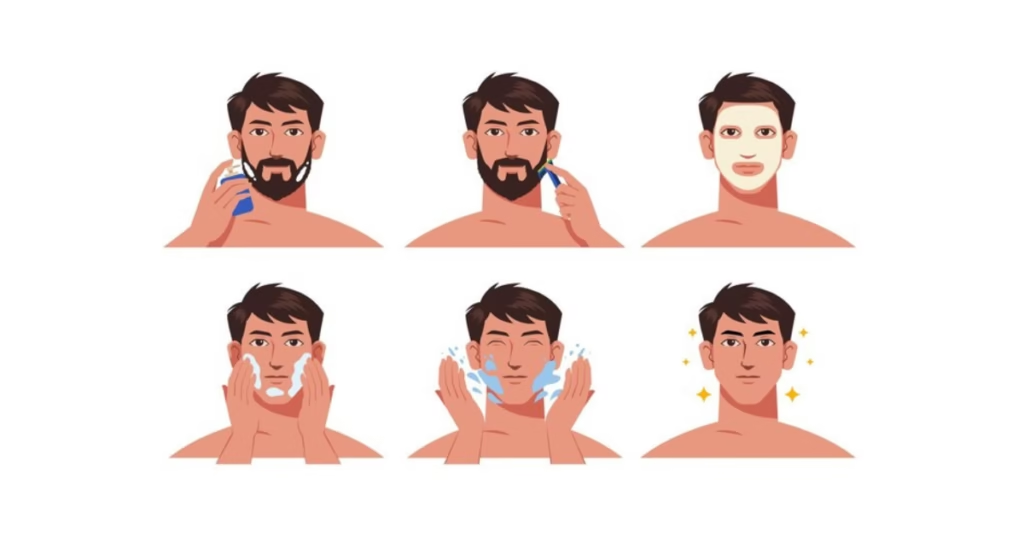
Introduction: Why Men’s Skin Is Different
Let’s cut straight to the chase: your skin isn’t the same as women’s skin. Thanks to testosterone, men’s skin is about 25% thicker, produces more oil, and has larger pores. You also have the unique challenge of dealing with facial hair and regular shaving. Understanding these differences is key to developing an effective skincare routine that actually works for you.
What makes men’s skin unique:
- Higher collagen density (which is why we age differently)
- More active sebaceous glands (hello, oil production)
- Regular trauma from shaving (which can lead to irritation and ingrown hairs)
- Different pH levels (more acidic than women’s skin)
Chapter 1: Understanding Your Skin Type
Before diving into specific concerns, you need to know what you’re working with. Here’s how to identify your skin type:
Oily Skin
You know you have oily skin if:
- Your face looks shiny by midday
- You’re prone to blackheads and enlarged pores
- Makeup or sunscreen seems to slide off quickly
- Paper blotting sheets come away looking like you’ve struck oil
Dry Skin
Signs of dry skin include:
- Feeling tight after washing
- Visible flaking or rough patches
- Fine lines appear more pronounced
- Skin feels itchy or uncomfortable
Combination Skin
The classic T-zone situation:
- Oily forehead, nose, and chin
- Dry or normal cheeks
- Different areas need different care
Sensitive Skin
Watch for these indicators:
- Frequent redness or burning
- Products often cause stinging
- Skin gets irritated easily
- Prone to rashes and breakouts
Chapter 2: Common Male Skin Concerns & Solutions
Acne: More Than Just Teen Trouble
Why men get acne:
- Higher testosterone levels increase oil production
- Sweat from workouts can trap bacteria
- Facial hair can trap debris and oil
Science-backed solutions:
- Use salicylic acid (2%) or benzoyl peroxide (2.5-5%) cleansers
- Apply a non-comedogenic moisturizer
- Consider retinoids for severe cases
- Keep hands and phone screens clean
Shaving Irritation: The Daily Battle
Prevention strategy:
- Always shave after showering (softer hair)
- Use a sharp, clean razor (replace every 5-7 shaves)
- Apply shaving cream with natural oils
- Shave in the direction of hair growth
Aging: Playing the Long Game
Key ingredients that work:
- Retinol (start with 0.25-0.5%)
- Vitamin C (L-ascorbic acid 10-20%)
- Peptides
- Niacinamide (5%)
Chapter 3: Building Your Routine
Morning Routine
- Cleanse with a pH-balanced face wash
- Apply antioxidant serum (Vitamin C)
- Moisturize (lighter for oily skin, richer for dry skin)
- ALWAYS use sunscreen (SPF 30+ broad spectrum)
Evening Routine
- Double cleanse if you wear sunscreen
- Apply active ingredients (retinol, acids)
- Use a repairing moisturizer
- Add eye cream if concerned about aging
Weekly Treatments
- Exfoliate 1-2 times per week
- Use a clay mask for oily areas
- Deep moisturizing mask for dry areas
Chapter 4: Lifestyle Factors
Diet & Skin Health
Foods that help:
- Omega-3 rich fish (salmon, mackerel)
- Antioxidant-rich fruits and vegetables
- Green tea (anti-inflammatory)
- Nuts and seeds (vitamin E)
Foods to limit:
- Dairy (can trigger acne in some men)
- High-glycemic foods
- Excessive alcohol
- Processed foods
Stress Management
Impact on skin:
- Increases cortisol production
- Can trigger breakouts
- Accelerates aging
- Compromises skin barrier
Solutions:
- Regular exercise (but wash face after)
- Adequate sleep (7-9 hours)
- Stress-reduction techniques
- Stay hydrated (aim for 8-10 glasses daily)
Chapter 5: Product Selection Guide
Essential Products Worth Investing In
Cleansers:
- Oily skin: Foaming cleansers with salicylic acid
- Dry skin: Cream cleansers with ceramides
- Sensitive skin: Fragrance-free, gentle formulations
Moisturizers:
- Oily skin: Gel-based, non-comedogenic
- Dry skin: Cream-based with hyaluronic acid
- Sensitive skin: Simple formulations with soothing ingredients
Sunscreens:
- Mineral-based for sensitive skin
- Lightweight formulas for oily skin
- Water-resistant for active lifestyles
Chapter 6: Common Questions & Misconceptions
Q: Do men really need a skincare routine? A: Yes. While men’s skin is naturally thicker and often oilier, it still needs protection and care to stay healthy and age well.
Q: Isn’t skincare just marketing to men? A: While there’s certainly marketing involved, the science behind skincare is gender-neutral. The key is choosing products based on your skin’s needs, not gender-specific marketing.
Q: How long until I see results? A: Timeline varies:
- Hydration: 1-3 days
- Oil control: 2-4 weeks
- Acne improvement: 4-8 weeks
- Anti-aging results: 8-12 weeks
Q: Can I use the same products as my partner? A: Possibly, but men often need different formulations due to thicker skin and higher oil production. Focus on your specific skin type rather than gender-marketed products.
Conclusion: Taking Action
Remember these key points:
- Consistency matters more than complexity
- Start simple and add products gradually
- Listen to your skin’s responses
- Don’t skip sunscreen
- Give new products time to work
Your skin is your body’s largest organ and deserves care. Start with the basics, be consistent, and adjust as needed. The best routine is one you’ll actually follow.

